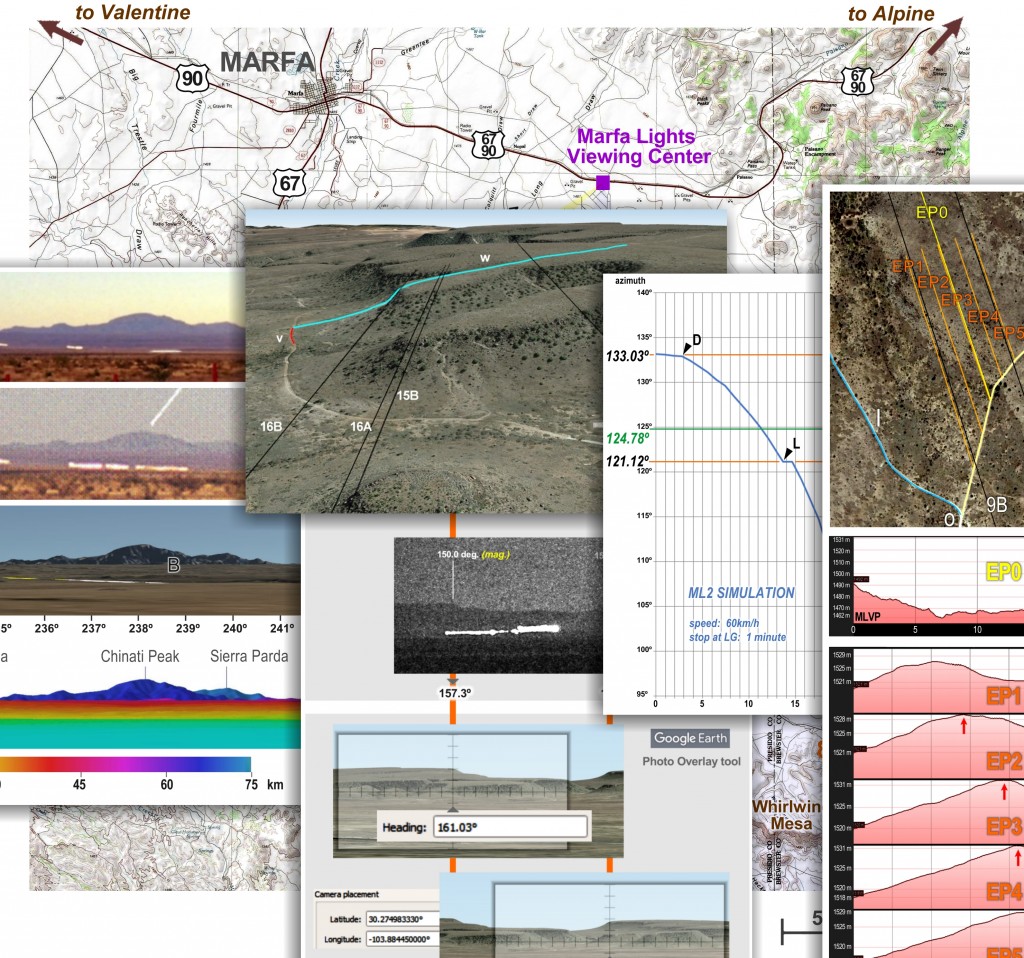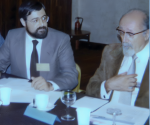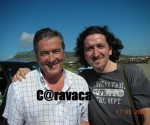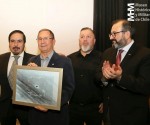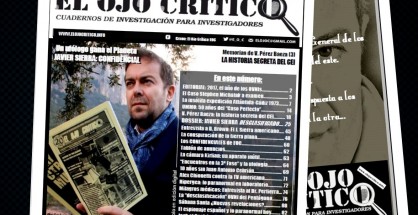THE MARFA LIGHTS. Las Luces de Marfa: Examinando la Evidencia Fotográfica, 2003-2007. De Vicente Juan Ballester Olmos y Manuel Borraz
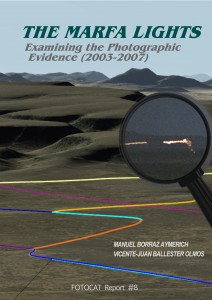 Nos complace anunciar la publicación de un libro dedicado al análisis científico de las fotografías de las llamadas “Luces de Marfa”, un fenómeno recurrente supuestamente anómalo observado en Marfa, Texas.
Nos complace anunciar la publicación de un libro dedicado al análisis científico de las fotografías de las llamadas “Luces de Marfa”, un fenómeno recurrente supuestamente anómalo observado en Marfa, Texas.
Entre 2003 y 2007 se tomaron siete series de fotografías de alta calidad en la zona, que mostrarían genuinos ejemplos de luces desconocidas evolucionando cerca del suelo, desafiando cualquier explicación convencional. Se trata de las mejores y más significativas fotografías jamás conseguidas del fenómeno.
Durante más de dos años, los autores hemos analizado estas imágenes usando un enfoque casi forense, llegando a conclusiones firmes que establecen la verdadera naturaleza de las luces, más allá de toda duda razonable. Estamos convencidos de que el corolario aplicado a las imágenes y sucesos discutidos en esta obra puede hacerse extensivo, justificadamente, al resto de las denominadas luces misteriosas de Marfa.
A partir de programas informáticos avanzados −geográficos y astronómicos−, hemos desarrollado una metodología específica y un proceso experto para analizar este tipo de evidencia fotográfica, que otros investigadores podrán aplicar para la identificación de imágenes semejantes de “luces misteriosas” en otras partes del mundo.
Estamos orgullosos de la reacción favorable que han mostrado hacia nuestro trabajo científicos de varias disciplinas, cuyos comentarios reproducimos seguidamente.
Este trabajo (Informe FOTOCAT Nº 8 en la serie de monografías producidas por el proyecto FOTOCAT), contiene 174 páginas, 102 ilustraciones (fotografías, mapas y diagramas) y 70 referencias. Este libro puede descargarse gratuitamente a través del siguiente enlace:
https://www.academia.edu/43589341/THE_MARFA_LIGHTS._Examining_the_Photographic_Evidence_2003-2007_
Opiniones expresadas por los primeros lectores
This research is unique and a major contribution to identifying the causes of the Marfa lights using models of cars traveling on distant highways and roads from across the Marfa plateau. It is amazing just how well the models replicate the ‘behavior’ of nearly, and likely, all of the known observations of this phenomenon. In the end, car headlights
combined with the mirage phenomenon are all that seem needed to once-and-for-all settle the many disputes about the origins of the Marfa Lights. Kudos to the investigators for offering this new and compelling evidence!
Dr. Sten Odenwald, Astronomer, NASA Space Science Education Consortium
An excellent scientific investigation. The depths of your analyses are remarkable.
Dr. Robert Wagers, co-author of Mysteries of the Marfa Lights Revealed, USA
A careful and painstaking investigation. You have done a good job of establishing the main point – that the Marfa Lights are just vehicle headlights. A job well done!
Dr. Andrew T. Young, Adjunct Professor of Astronomy, San Diego State University, USA
The authors have carried out a very thorough and scrupulous analysis. They managed to prove that Marfa Lights can be explained in the context of well-known ideas about the propagation of light emitted by car headlights. The techniques used by the authors of the book may also be useful for studying the phenomenon of ball lightning.
Dr. Anatoly I. Nikitin, Secretary of the International Committee of Ball Lightning, Member of the Russian Academy of Natural Sciences, Russia
It is a fascinating project; you and your colleague have obviously put a lot of time and careful thought into it… your methodology seems sound and I find your report persuasive.
Dr. Peter A. Sturrock, emeritus Director of the Center for Space Science and Astrophysics, Stanford University, USA
Great work. Not a refutation but a full reanalysis. Overwhelming and solid conclusions.
Julio Plaza del Olmo, physicist and investigator, Spain
You have criticized the estimations of height using a reasonable qualitative guess (atmospheric refraction of the image), and for the velocity using a quantitatively better measure of time (from star image tracks in the observations). I think that your analysis as far as it goes is good.
Dr. John Abrahamson, Department of Chemical and Process Engineering, University of Canterbury, New Zealand.
A work of great precision and a very useful job.
Dr. Sergey Chernouss, Polar Geophysical Institute, Russian Academy of Sciences, Russia
The report is perfectly argued and remarkably carried out. The visual appearance and behavior of the lights is incoherent with a possible luminous phenomenon of natural origin and related to electricity or natural magnetism.
Dr. Raymond Piccoli, Director of the Laboratoire de Recherche sur la Foudre, France
Having plowed the field of anomalous aerial phenomena for 45 years myself, I would rank this essay among the dozen or so best documented and most thoroughly researched studies on the subject ever published. The science is outstanding and the arguments solid.
Wim van Utrecht, Caelestia Project, Belgium
I fully agree with the methodology you explained. I consider that this work can be used as an example of scientific method. I have always considered Marfa lights with no strangeness and without any interest, and you have made a lot of good work in order to dismiss the way believers perceive facts.
Dr. Claude Poher, former Space Research Engineer in CNES, creator of GEPAN in 1977 (SEPRA/GEIPAN), Quantum Gravitation researcher, France
Your book is a detailed and painstaking work that covers a comprehensive overview of existing Marfa Lights studies and a thorough research of their origins.
Dr. Artem S. Bilyk, Assistant Professor, Kiev Polytechnical Institute, Chairman of SRCAA “Zond”, Ukraine
Somebody could say “all this work to get there”. I would say YES. It is necessary, because to believe is easy, to understand is hard work. So, congratulations to the authors for their hard work. Today, our society is strongly concerned with fake news and some aversion to science, and any contribution which tries to balance this attitude is welcome.
Marcel Delaval, Informatics engineer, Joint Research Center of the European Commission, Ispra, Italy
When trying to observe the Lights with the CBS crew for “Unsolved Mysteries”, I did determine that the Lights were incandescent in nature. Which fits with the “car light” hypothesis, but I really had hoped to make additional measurements of the Lights spectral signature to match those of car head lights. I never had the opportunity to do so.
Dr. Edwin Barker, University of Texas, McDonald Observatory, NASA/JSC Orbital Debris Program (ret), USA
The authors have tested the simplest hypothesis, one already postulated by other investigators: the light track phenomena observed are produced by car lights. In every single event when geographical verification has been possible, the photographed luminous trails match with local roads. These findings strongly weaken the hypothesis of existence of anomalous phenomena close to Marfa, Texas. This book is a great example of what should be a modern analysis of data on natural phenomena.
Prof. Vladimir Bychkov, Academician of Russian Academy of Natural Science, Russia
In this overwhelming work, Borraz and Ballester Olmos have analyzed some of the strangest Marfa Lights photographs and concluded that their nature is perfectly compatible with motor vehicle lights, without the need to invoke any unknown geophysical phenomena. During their work they mainly used software like Google Earth’s Photo Overlay tool and the stellar program Stellarium. Multiple hours of analysis and insight have revealed key errors in photographer’s data. The few existing discrepancies can be perfectly explained by the usual light refractions at these latitudes, the study of temperature inversion during the days of the events would confirm their suspicions to 100 percent. Marfa Lights are not a mystery anymore.
Dr. Félix Ares de Blas, Professor of Technology and Architecture of Computers, Universidad del País Vasco, co-author of El fenómeno OVNI. Análisis de 30 años de observaciones en España, Spain
In this book, Manuel Borraz and V.J. Ballester Olmos present a quite convincing example of what can be a thorough scientific investigation. They tackle the issue of the famous “Marfa lights” photographs, and more precisely of the so-called “genuine Marfa lights”, which represent a selection of the best and most controversial particular pictures. They choose a quite original and efficient approach, taking advantage in a very clever way of powerful existing tools available through Internet: Google Earth and Stellarium. The quality and the accuracy of their rigorous and neutral analysis of the set of photos deserve my best congratulations.
Dr François Louange, Manager of IPACO (www.ipaco.fr), GEIPAN expert, Member of 3AF Sigma 2, France
I have always had a great respect for works related to real explanations of strange phenomena observed in the atmosphere and near space. I believe that the work you have done is very useful and highly commendable.
Dr. Yulii V. Platov, Pushkov Institute of Terrestrial Magnetism, Ionosphere and Radio Wave Propagation (IZMIRAN), Russian Academy of Sciences, Russia






